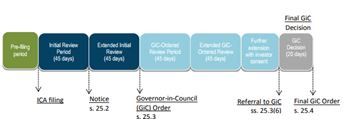Co-authored by Alma Borojeni, Student-at-Law
The 2016-2017 annual report on the administration of the Investment Canada Act (the "Annual Report") was published on August 31, 2017.1 The Annual Report covers the fiscal year beginning April 1, 2016 and ending March 31, 2017. This year's Annual Report is notable for providing a detailed analysis of the implementation of the enterprise value threshold test for net benefit reviews and for examining the enforcement of the national security provisions of the Investment Canada Act (the "ICA")2 for the first time.
ICA Net Benefit Review
A) New Thresholds
The Annual Report highlights the recent amendments that accelerated the increase of the threshold for ICA's net benefit review threshold for WTO private sector investors to C$1 billion (effective June 22, 2017) and additional amendments introduced in Bill C-30 that will increase the threshold to C$1.5 billion for Canada-European Union Comprehensive Economic and Trade Agreement ("CETA") and other bilateral trade partners (including the United States) once Canada and the EU implement CETA. We note that the Government and the EU have announced that CETA will be provisionally applied starting September 21, 2017.3 As a result, as of that date, it is anticipated that the amendments implementing CETA's C$1.5 billion threshold will be proclaimed into force.
B) Reviews in the Past Fiscal Year
The Annual Report was prepared by the Ministry of Innovation, Science and Economic Development Canada, which is tasked with reviewing non-cultural investments. Therefore, the discussion and statistics below do not take into account notices and applications received by the Minister of Canadian Heritage that relate to cultural investments.
With respect to activity for the fiscal year, 737 investment filings were approved or certified under the ICA representing C$50.31 billion in Enterprise Value and C$20.09 billion in Asset Value. Of these, 22 were applications for net benefit review that were approved, a significant increase from the 15 applications that were approved over each of the last two fiscal years.
The increase in applications for review (from 15 to 22) is particularly notable as the 2016-17 fiscal year was the first full year involving the enterprise value test for most transactions (in place of the asset value test). Even though the threshold went from C$369 million in asset value to C$600 million in enterprise value, the number of net benefit reviews increased significantly (an approximate 50% increase). Logically, this number should drop in the coming years as the enterprise value threshold was raised to C$1 billion in June 2017 and, if the CETA thresholds take effect as anticipated, will soon be C$1.5 billion for CETA jurisdictions and other bilateral trade partners (including the United States). Of note, in 2016-17, investors from the United States accounted for 54% of the processed investments and EU countries accounted for 25% of the total processed investments. The Annual Report indicates that only 13 investments with more than C$1 billion in enterprise value were received in the 2016-17 fiscal year. The higher basic threshold and the implementation of CETA should lead to very few net benefit reviews, except with respect to cultural investments or investments by state-owned enterprises.
ICA National Security Review
A) History of the National Security Review
In 2009, the ICA was amended to provide the Government of Canada with the authority to review foreign investments for potential harm to national security. The Governor-in-Council (the "GiC") may take any measure with respect to an investment that it considers advisable to protect Canada's national security. Such potential orders include directing the investor not to implement an investment (or directing the investor to divest control of a recently implemented investment) or authorizing an investment on condition that the investor either provides written undertakings that the GiC considers necessary in the circumstances or implements an investment on the terms and conditions ordered by the GiC.
These provisions apply to a broader set of investments by non-Canadians than the net benefit review provisions, including the acquisition of control of a Canadian business valued below the relevant net benefit review threshold, the establishment of a new Canadian business, and the acquisition of an interest in a Canadian business that represents less than a controlling interest.
B) National Security Review Process and Timeline
The Annual Report provides a graphic summary showing the stages of a national security review process:4

Initial Review Period: For investments that require notification or an application for review under the ICA, there is a 45 day period from the date that a complete notification or application is received by the Government in which the Minister of Innovation, Science and Economic Development (the "Minister") can either decide (i) not to initiate a national security; (ii) to initiate a national security review by having the GiC make an order under section 25.3 of the Act; or (iii) to send a notice to the investor under section 25.2 of the Act informing the investor that the Government requires up to 45 more days to determine whether or not to issue a national security review. For investments that do not require either a notification or an application for review under the ICA, the Initial Review Period lasts until 45 days after the investment has been implemented.
Extended Initial Review Period: Following receipt of section 25.2 notice, if the investor has not yet implemented the investment, it must refrain from doing so until the investor receives Government approval to implement the investment. Within 45 days, the Minister must decide whether to allow the investment or to order a national security review. During this period, it is common for the Minister to ask questions of the investor and for the investor to engage in dialogue with the Minister.
National Security Review Period: Once a national security review is ordered, the Minister has 45 days to decide to make a recommendation to the GiC or to send a notice under section 25.3(7) of the Act of an extension.
Extended National Security Review Period: A mandatory extension under section 25.3(7) of the Act provides the Minister with an additional 45 days to make its recommendation to the GiC, unless the investor agrees to any further extensions of the review period.
Further Extension: The investor and Minister can agree to further extensions to the Minister's national security review period, as desired.
GiC Decision: Following its receipt of a recommendation from the Minister, the GiC has 20 days to decide whether to permit the investment without conditions, permit the investment with conditions, or order the investor not to implement an investment (or to divest the recently implemented investment).
C) National Security Review Statistics
During the 2016-17 fiscal year, the Minister issued 4 notices of a potential national security review to investors under section 25.2 of the Act. Of these, 2 investors received subsequent notices indicating that no national security review would be ordered.5
A total of 5 national security reviews were conducted, 4 of which were the result of ministerial order for review, while the other was pursuant to a November 2016 Federal Court order that set aside a July 2015 section 25.3 order for divestiture and remitted the matter back for a new national security review.6 In each of these 5 cases, a final order was issued on the investment under s. 25.4. In 3 of these cases, the investor was ordered to divest control of the Canadian business. In the 2 other cases (including the case that was remitted back for review by court order), the investment was permitted to proceed with the imposition of conditions that mitigated the Government's national security concerns.7
The 5 national security review in 2016-17 represents an increase from prior years (1 in 2015-16, 4 in 2014-15, 1 in 2013-14 and 2 in 2012-13). Of the 8 national security reviews from prior years, 3 were blocked, 2 had conditions imposed, 2 required divestitures, and 1 transaction was withdrawn prior to the completion of the national security review.
D) Application of the National Security Guidelines
As discussed in our January 2017 bulletin, the Government introduced national security guidelines in late 2016 (the "Guidelines").8 Several national security factors, as identified in the Guidelines, gave rise to the orders issued since 2012, including: the potential for injury to Canada's defence capabilities; the potential for transfer of sensitive dual-use technology or know-how outside of Canada; the potential impact of the investment on the supply of critical goods and services to Canadians; the potential to enable foreign surveillance or espionage; the potential for injury to Canada's international interests; and the potential of the investment to involve or facilitate organized crime. The most common factors that gave rise to national security issues were the potential for transfer of sensitive dual-use technology or know-how outside of Canada, the potential to negatively impact the supply of critical services to Canadians or the Government, and the potential to enable foreign surveillance or espionage.
Final Thoughts
This year's ICA Annual Report provides welcome insight into the administration of the Investment Canada Act. In particular, the statistics on net benefit reviews provide helpful clarity on the likely impact of the increased enterprise value thresholds. Moreover, the report on the enforcement of the national security provisions provides additional transparency regarding the number and type of transactions that may be reviewed for national security issues and the timing implications of any such reviews.
Footnotes
[1] Innovation, Science and Economic Development Canada, "Annual Report; 2016-2017", Report (31 August 2017) [the "Annual Report"].
[2] Investment Canada Act, RSC 1985, c 28 (1st Supp).
[3] Justin Trudeau, Prime Minister of Canada, "Joint statement by the Prime Minister and the President of the European Commission on reaching a date for the provisional application of the Comprehensive Economic and Trade Agreement", News Release (8 July 2017).
[4] See the Annual Report at "Information on the National Security Review Process".
[5] While it is not known which two investments received this treatment in the 2016-2017 fiscal year, one investment that appears to have fallen into this category was the recent acquisition by Hytera (a private Chinese communications company) of Vancouver technology company Norsat International. See: Joanna Smith, " 'Some baloney' in PM's claim Hytera went through national security review" (15 June 2017), CTV News.
[6] This latter national security review related to Hong Kong's O-Net Technology Group's proposed acquisition of ITF Technologies, a Montreal technology company specializing in fiber components and modules. See: Julius Melnitzer, "Feds agree to new national security review for foreign businessman" (22 November 2016), Lexpert Online.
[7] O-Net's acquisition of ITF Technologies is one of the transactions that was permitted to proceed with conditions attached. See: Steven Chase, "Liberal green light for Chinese takeover deal a turning point for Canada: experts" (28 March 2017), The Globe and Mail.
[8] Innovation, Science and Economic Development Canada, "Guidelines on the National Security Review of Investments", Guidelines Document (19 December 2016).
The foregoing provides only an overview and does not constitute legal advice. Readers are cautioned against making any decisions based on this material alone. Rather, specific legal advice should be obtained.
© McMillan LLP 2017


